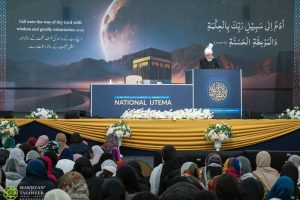On 26th March, Women’s March London invited women of all faiths and communities to stand with their fellow citizens to protest the Westminster attacks and to stand in solidarity with the victims. Members of Lajna Ima’illah also participated in this vigil. Two women reflect on what this event meant to them.
I am a Londoner, Sarah Waseem, UK

On 26th March, I participated in a very unusual event. Along with about ten other ladies from the Ahmadiyya Muslim Community, we joined a larger group of women drawn from various walks of life to stand for five minutes on Westminster Bridge to remember those who died on 22nd March, 2017. The event, organised by the Women’s March London, was very low-key: no banners, no loudspeakers, no speeches, no leaflets – just a simple request for women to join together to remember those who had been murdered that fateful day.
We stood hand in hand, Muslim and non-Muslim, for five minutes in silence. People passed us by – some stopped to take photos of us, while others watched us. The experience was very emotional. Here we were, reminding people that terror attacks affect us too and that, in the words of the Holy Qur’an, ‘Whoso kills a person, except for killing another or for creating disorder in the land, it shall be as if he had killed all mankind’1. Here we were – a visible living statement to people that we, as Muslim women condemn violence of all sorts.
As I recalled the tragic events of that day, it seemed surreal to think that one person could have caused so much pain to so many, in that act of mounting the pavement with a car and deliberately crashing into the crowds. I felt overwhelmed reflecting on the deaths of innocent people, those who had sustained injuries, the violence of brutal murder in Parliament Square – and the grief of those who were now bereaved.
I am not one to relish personal attention and I felt quite vulnerable being watched by so many as we stood by the cold wall of the bridge. All I could hear was the incessant clicking away of cameras. What were they thinking of us? ‘What are these Muslim women doing?’ It bothered me, as it always does, to think some might be even be afraid of us – all these Muslim women in hijabs standing on this beautiful bridge which had been the scene of such horror earlier in the week.
I am a Londoner. I am proud of this city of ours, home to such a divergent range of cultures and faiths. Acts of terror affect me, as they do the next person, but more so because when a so-called Muslim commits such a barbaric crime, he or she disgraces all of us and does a grievous injustice to the name of the founder of this faith – the Holy Prophet Muhammadsa. His kindness, compassion and mercy to all was unrivalled. Under the guidance of the teachings of Islam, he brought peace and civilisation to the unruly and uncivilised nation that was pre-Islamic Arabia.
As a Muslim, my religion teaches me that I have responsibility to maintain peace in society – to observe law and order, and to respect those in authority. My Islam guides me to care for the young, the old, the orphans and the dispossessed, to respect others’ faith and to safeguard freedom of belief. This is not a faith of terror and extremism. ‘Moderation in all things’ was the way of the Prophet of Islam.
As I stood on the bridge, and the minutes moved on, a sense of calm come over me. Suddenly it did not matter anymore what people might be thinking. I was proud to be there – to show passers-by that I, as a Muslim, cared about what had happened in my city, and that I condemned it. I hoped that with my companions, we had in some small measure showed that terrorism could not divide us from them, that we were at one with them and that perhaps we could reassure them that Islam was not the enemy.
We Stand Together, Ayesha Malik, UK

As London responded to and digested the first major terrorist attack on her streets in almost ten years, we were asked to join in a rather unusual event by the organisers of the Women’s March on London. A vigil was being planned at the place where the act of terror unfolded in order to honour those who had lost their lives when Khalid Masood indiscriminately drove a vehicle through people on Westminster Bridge on that fateful afternoon of 22nd March. This vigil however was slightly peculiar – no prior advertising on social media, no banners, no loud speakers – just women coming together to hold hands along Westminster Bridge for five minutes.
Not having participated in anything like it before, we hardly knew what to expect. In our minds, it was probably going to be a non-event – a group of women holding hands on Westminster Bridge on an otherwise beautiful Sunday afternoon. Eleven members of the Ahmadiyya Muslim Women’s Association (AMWA), including myself, journeyed to one of London’s most visited tourist destinations in order to show our solidarity with the city we all love as she grieved.
As I walked up Westminster Bridge, I was struck by the resilience of Britain’s capital as people flocked to the Bridge as normal, taking pictures against the backdrop of the London Eye and the Houses of Parliament. I had had, along with my ten other colleagues from the AMWA, some anxiety about being present at the very spot a terrorist incident took place just days ago. It did unsettle us to think though that we were all visibly Muslim, donning headscarves, and as emotions still ran high we were wary of how our contribution as Muslims would be received that afternoon.
However, as Big Ben chimed at 4pm, the line of women holding hands along Westminster Bridge fell silent. Heads down and with hearts full of prayers, those five minutes wore on forever. Passersby on the Bridge stopped to take pictures, muse and survey this group of sixty-odd women representing a cross-section of London’s diverse demographic, coming together to lock hands with each other, commemorating victims of an act of terrorism. The paparazzi from various media outlets soon followed – to our surprise and bemusement – and the cameras clicked incessantly and were only interested in one aspect of the vigil – us.

As the journalists persisted in taking photographs, the impact of our otherwise symbolically small gesture began to unfold upon me. Here we were, a group of headscarf-donning women showing solidarity with victims of terrorism and with the country as a whole at the very place an individual had carried out a heinous crime in the name of the Islamic faith. We stood there to demonstrate that Muslims were law-abiding, peaceful citizens who condemned cowardly acts of terror as un-Islamic and entirely unacceptable – and it had obviously struck a chord.
To our complete surprise, not only did the press flock to take our pictures and interview us that afternoon, different media outlets followed us up the next day with requests for interviews. Just eleven women appeared on the photo that went viral, not merely across the UK, but across six continents. We had acted under the guidance of the Head of the Worldwide Ahmadiyya Muslim Community – Hazrat Mirza Masroor Ahmadaba – and the overwhelming response we received was a reminder that the blessings of acting under the guidance of spiritual leadership are profound.
Endnotes
1. The Holy Qur’an, 5:33.




Add Comment